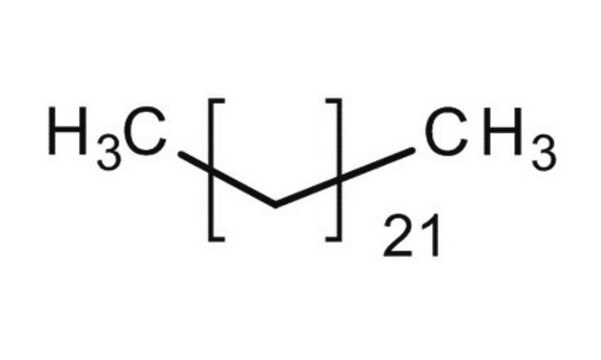All Photos(1)
About This Item
Linear Formula:
CH3(CH2)21CH3
CAS Number:
Molecular Weight:
324.63
Beilstein:
1756000
MDL number:
UNSPSC Code:
12352100
PubChem Substance ID:
NACRES:
NA.22
Recommended Products
Assay
99%
form
solid
bp
199-200 °C/3 mmHg (lit.)
mp
46-47 °C (lit.)
SMILES string
CCCCCCCCCCCCCCCCCCCCCCC
InChI
1S/C23H48/c1-3-5-7-9-11-13-15-17-19-21-23-22-20-18-16-14-12-10-8-6-4-2/h3-23H2,1-2H3
InChI key
FIGVVZUWCLSUEI-UHFFFAOYSA-N
Looking for similar products? Visit Product Comparison Guide
Application
Tricosane is an aliphatic alkyl chain that can be used:
- As a phase change material for electronic cooling applications.
- To prepare ticosane functionalized single-walled carbon nanotube (SWCNT) biosensors for the detection of volatile organic molecules in human breath.
Storage Class Code
11 - Combustible Solids
WGK
WGK 3
Flash Point(F)
235.4 °F - closed cup
Flash Point(C)
113 °C - closed cup
Personal Protective Equipment
dust mask type N95 (US), Eyeshields, Gloves
Certificates of Analysis (COA)
Search for Certificates of Analysis (COA) by entering the products Lot/Batch Number. Lot and Batch Numbers can be found on a product’s label following the words ‘Lot’ or ‘Batch’.
Already Own This Product?
Find documentation for the products that you have recently purchased in the Document Library.
Disorder in the pseudohexagonal rotator phase of n-alkanes: molecular-dynamics calculations for tricosane.
Ryckaert J-P, et al.
Molecular Physics, 67(5), 957-979 (1989)
Heat pipe with PCM for electronic cooling
Weng Y-C, et al.
Applied Energy, 88(5), 1825-1833 (2011)
Gilles Storelli et al.
Developmental cell, 48(2), 200-214 (2018-12-18)
Animals must adjust their metabolism as they progress through development in order to meet the needs of each stage in the life cycle. Here, we show that the dHNF4 nuclear receptor acts at the onset of Drosophila adulthood to direct
Luana Quassinti et al.
Fitoterapia, 97, 133-141 (2014-06-14)
Smyrnium olusatrum (Apiaceae), well known as wild celery, is a biennal celery-scented plant used for many centuries as a vegetable, then abandoned after the introduction of celery. In the present work, the essential oil obtained from inflorescences and the amounts
Christian Zorzetto et al.
Fitoterapia, 100, 95-109 (2014-12-03)
In the present work we carried out a phytochemical and biological investigation on three Hypericum species, i.e. Hypericum reflexum, Hypericum canariense and Hypericum grandifolium, from the Canary Islands where they are traditionally used as diuretic, wound healing, vermifuge, sedative and
Our team of scientists has experience in all areas of research including Life Science, Material Science, Chemical Synthesis, Chromatography, Analytical and many others.
Contact Technical Service







